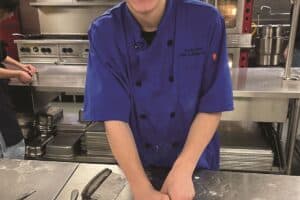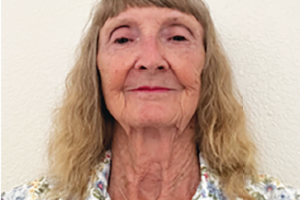Edith Fisher ìlovesî yarn, knitting, teaching people how to knit, her seven cats and her four alpacas that she calls ìthe boys.îFisher said she always wanted to have her own knitting business. ìI learned knitting, crocheting, sewing and needlepoint before I even started first grade,î Fisher said. ìMy grandma was a tailor and my great grandpa owned a tailor shop; it was sort of a family trade.îHowever, she would be sidetracked for a few years.Fisher moved to the United States from Germany at 24 years of age and joined the U.S. Air Force. During her years of service, she took advantage of the militaryís education assistance program and received her bachelorís degree in small business management.Although she applied for citizenship, she moved often for new assignments and had to reapply to become a citizen every time. In 1983, she enlisted the support of a congressman in Florida. ìI said to myself, enough is enough, and a month later, I was in Tallahassee getting my citizenship,î Fisher said.While stationed at Eglin Air Force Base in Fort Walton Beach, Florida, she met her husband. They married in November 1985 in Pensacola, Florida. The marriage allowed them to be assigned together. Their last assignments were in Colorado; while her husband was stationed at Peterson AFB; she served at Schriever AFB. Fisher retired in 1998 after serving 20 years.After retiring, Fisher worked for six years at the Peterson commissary bagging groceries to save money to launch her knitting business.She became interested in alpacas when her mom gave her a scarf and hat for Christmas made from alpaca fiber. ìThe fiber intrigued me, and I found an ad in the Mountain View Electric paper about someone who sold alpacas in Larkspur, Colorado, so I went for a visit.î She said at that time it cost about $15,000 for a female alpaca. ìThat was at the height of the industry, and I couldnít afford that.î She wanted the alpacas for their fiber, not to breed them. ìThatís not me, I canít give them away,î Fisher said. ìOnce those guys come into your life, theyíre family.îIn 1998, she bought her first alpaca, Mr. Spock, at an auction in Nebraska. Soon after, she acquired her second alpaca, Spicy.At that time, the Fishers lived in Falcon Hills, and the two alpacas resided in their backyard for a couple of years. In 1999, she launched her business and named it, ìThe Woolly Sheep.î She sold her products out of her living room and at different consignment stores for more than 10 years; she also participated in fiber shows throughout Colorado.In 2004, they built a house in Elbert, and she set up her business in the basement ó and changed the name of her business to Woolly Works Farm & Knit Shop.When Mr. Spock died in 2005 after being attacked by a dog, Fisher called Pikes Peak Alpacas to purchase another alpaca. ìAlpacas are herd animals, they canít be alone,î Fisher said. She then acquired Black Bart, Bruno and Bolivar. After Spicy died at 19 years old, she obtained Shiloah from Woodlake Woolies.In 2012, she said she opened a store in downtown Colorado Springs, but the area presented many challenges. ìThere are no public restrooms, so everyone wants to come into the store and use the bathrooms,î Fisher said. ìAnd the homeless people wanted to come in and sit for hours at a time.î She said she had to call the police three times for assistance.Her husband unexpectedly passed away in 2015. ìBetween losing Clyde and the challenges of the business, I was getting burnt out,î she said.Two years ago, Fisher renovated the basement in Elbert and moved her shop from downtown Springs ó right before COVID-19 hit. ìIím glad I moved when I did; I donít think the business would have made it,î Fisher said. Along with the original store area, she added a studio where she knits and an area for yarn, supplies and a community table. ìItís a lot more stress-free now; I just walk downstairs,î she said.Saturday morning is ìknit-alongî day, Fisher said. She makes German cake and people come out and practice knitting together at the community table. The knit-alongs are free; the tradeoff is that the students buy their supplies from her, she said. Fisher also teaches classes, including crochet.ìI love yarn,î she said, and she knows plenty about yarn. ìThe absolute top yarn is called vicuÒa. I canít even afford to sell it in my store.î She said it comes from the wild alpacas in South America. ìSelling vicuÒa is part of their gross national income; they wonít export any of their animals because of that.îFisher participates in the Alpaca Extravaganza and belongs to the Angels Knit Club, Southeastern Colorado Alpaca Breeders and the Black Forest Arts and Crafts Guild. She will be selling felted slippers and German cakes at the Black Forest arts and crafts show this year, which ends May 2.







